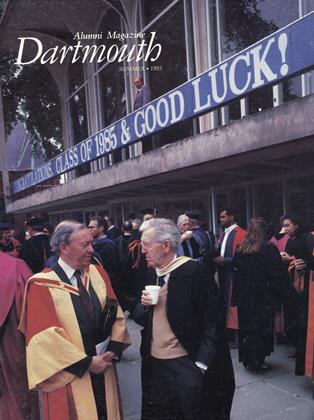This summer, Daniel Dimancescu '64 hopes to dispel some of the "M*A*S*H stereotypes" Americans are inclined to have about Korea. A veteran explorer and international high-technology consultant, Dimancescu will be leading a kayaking expedition off the coast of Korea this July and August. He will not be the only Dartmouth presence on the six-week trip. Also among the ten expedition members will be five recent graduates and undergraduates - Jamie Hardigg '80, David Hamlin '82, Viva Hardigg '85, Elizabeth Webb '85, and Sarah Wauters '86. In addition, the Ledyard Canoe Club is the official sponsor of the expedition, a role that involves organizational backing though no financial subsidy. The trip is being underwritten by The National Geographic, which plans a major article on the venture, and by one of two Korean national television companies.
The 500- to 600-mile expedition will begin along the very rural west coast, will range through the islands of a large national park system that is becoming a popular tourist area, and will wind up on the east coast, the most economically active area in Korea outside Seoul. Though Korea is one of the biggest economic boom areas in Asia, Americans don't know much about the country. Understanding and being a part of Korea's growth are very important to the future of America, Dimancescu feels
There are cultural reasons for undertaking the trip as well. "We have to remember that Korea was a wasteland 30 years ago" explains Dimancescu. "The Korean War was just ended . . . there was no such thing as a highway. Korea has gone through an amazing transition. The question is how much have they destroyed their past. Dartmouth may possibly raise the consciousness of Korea to some of its resources."
Dimancescu has previously organized three similar expeditions covered in National Geographic: a 1964 trip on the Danube River, a 1966 trip up the coast of Japan, and a 1968 trip through the Carpathian Mountains. He had never been to Korea, however, till just two years ago. What he found there "stimulated [him] to get to know Korea more intimately."
Dimancescu hopes that the understanding generated by the expedition and the resulting media coverage will have longterm benefits. He intends to invite some of the Koreans they meet to the United States next summer. And his fondest hope is that some permanent exchange program - perhaps between Dartmouth and some Korean university - might come out of the venture, to further the College's "tradition of exploring and of being inquisitive internationally."
 View Full Issue
View Full Issue
More From This Issue
-
 Feature
FeatureA Humanist Ponders the Future of Liberal Education
June 1985 By Charles T. Wood -
 Feature
FeatureAn Apple on Every Desk
June 1985 By Fred Pfaff '85 -
 Feature
FeatureThe Great Train Robbery
June 1985 By Fred Pfaff '85 -
 Feature
FeatureThe Wentworth Bowl
June 1985 By Barbara J. MacAdam, Curator, Hood Museum of Art -
 Cover Story
Cover StoryValedictory Address
June 1985 -
 Feature
FeatureReunions 1985
June 1985 By Robert Frost
Article
-
 Article
ArticleINFORMATION SERVICE ESTABLISHED IN PRESIDENT'S OFFICE
MARCH, 1928 -
 Article
ArticleProf. Smith '21 Leaves
October 1933 -
 Article
ArticleAd Men's Pal
April 1941 -
 Article
ArticleActing Medical Dean
MARCH 1973 -
 Article
ArticleThe Undergraduate Chair
April 1938 By BEN AMES WILLIAMS JR. '38 -
 Article
ArticleThe Parkhurst Elm
OCTOBER 1998 By Everett Wood '38

